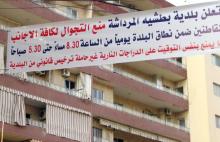You are here
Conflict Incident Report
Baabda town enacts illegal curfew on ‘foreigners’
A municipality in Baabda appears determined to enforce a curfew on Syrian laborers, even though the step is illegal. Snapshots of banners announcing a curfew for “foreigners” between 8:30 p.m. and 5:30 a.m. in the town of Betshai-Mardasheh, located next to Baabda, were circulated on social media sites last week, provoking outrage among many who decried the clampdown as “racist.”
Interior Minister Marwan Charbel told LBCI over the weekend that the municipality was barred by law from passing resolutions that infringe on the authority of the state security forces, but has so far taken no action on the matter.
“The municipality cannot issue a curfew for anyone, be it a citizen or a non-citizen, not to mention that it is completely racist,” lawyer Karim Nammour said, describing Charbel’s equivocation regarding the enforcement of the law as “irresponsible.”
The banners were still strung across major thoroughfares of the town when The Daily Star visited Sunday and many residents expressed their support for the curfew.
Gaby Hobeika, 50, said it was necessary because of a rise in crime, which he blamed on Syrian laborers.
“They wrote ‘foreigners’ [on the announcement] because they don’t want to write Syrians, but the only foreigners here at night are Syrians,” he said. “It’s for security; it’s not because we don’t like Syrians. They are welcome in our homes, but at night, they are going out and making trouble, harassing girls; this is why there is a curfew.”
Betshai is a small, predominantly Christian village overlooking Beirut, the kind of place where everyone knows each other and the municipality is hidden away on the fourth floor of a nondescript apartment building, devoid of security presence on a Sunday.
According to locals, the recent influx of foreigners, particularly Syrians, who are either employed in local factories or fleeing rising rents in Beirut, has unsettled long-time residents.
Gaby Hobeika’s views were common among several people who spoke with The Daily Star. In fact, according to local residents, there has been a 10 p.m. curfew in place for some time.
“The first time we tried it there were still a lot of thefts and thuggery,” said Mazen Aramouni, 27, explaining the earlier curfew. “The workers at construction sites were being loud and quarrels broke out.”
The few Syrian workers who were out and about Sunday afternoon appeared wary of a reporter, but said they had no problem with the curfew.
“This is a normal step, any area can do it, no problem,” said a 17-year-old Syrian from Deir al-Zor who arrived just a few weeks ago.
“We went out after 8 p.m., and they told us ‘don’t go out,’” said the young man, who declined to give his name, while emphasizing he has not had any problems with the Lebanese in town, who he described as “nice.”
Fattouh Suleiman, 28, from Aleppo, has been working in Lebanon for years and is better off financially than many of his countrymen. Suleiman said he has not been affected by the curfew because he has a car, and the rule is only enforced for pedestrians.
“It’s fair, they are also protecting us as well,” he said of the curfew, but admitted that Syrians without a car have no option but to stay indoors at night. “The decision has been made and they can’t do anything about it. They [the municipality] won’t repeal it.”
According to Nay al-Rahi of the Antiracism Movement, the curfew is just one manifestation of a pervasive and hostile attitude toward Syrians that can be seen at the top levels of government as well as on the street.
“Aside from the fact that it’s illegal ... it’s completely unacceptable, but it’s all in line with this discourse that refugees and foreigners are basically the cause of all crimes and problems,” she said. “It’s not isolated, and it’s getting more aggressive.”
http://www.dailystar.com.lb/News/Politics/2013/Feb-25/207793-baabda-town...


